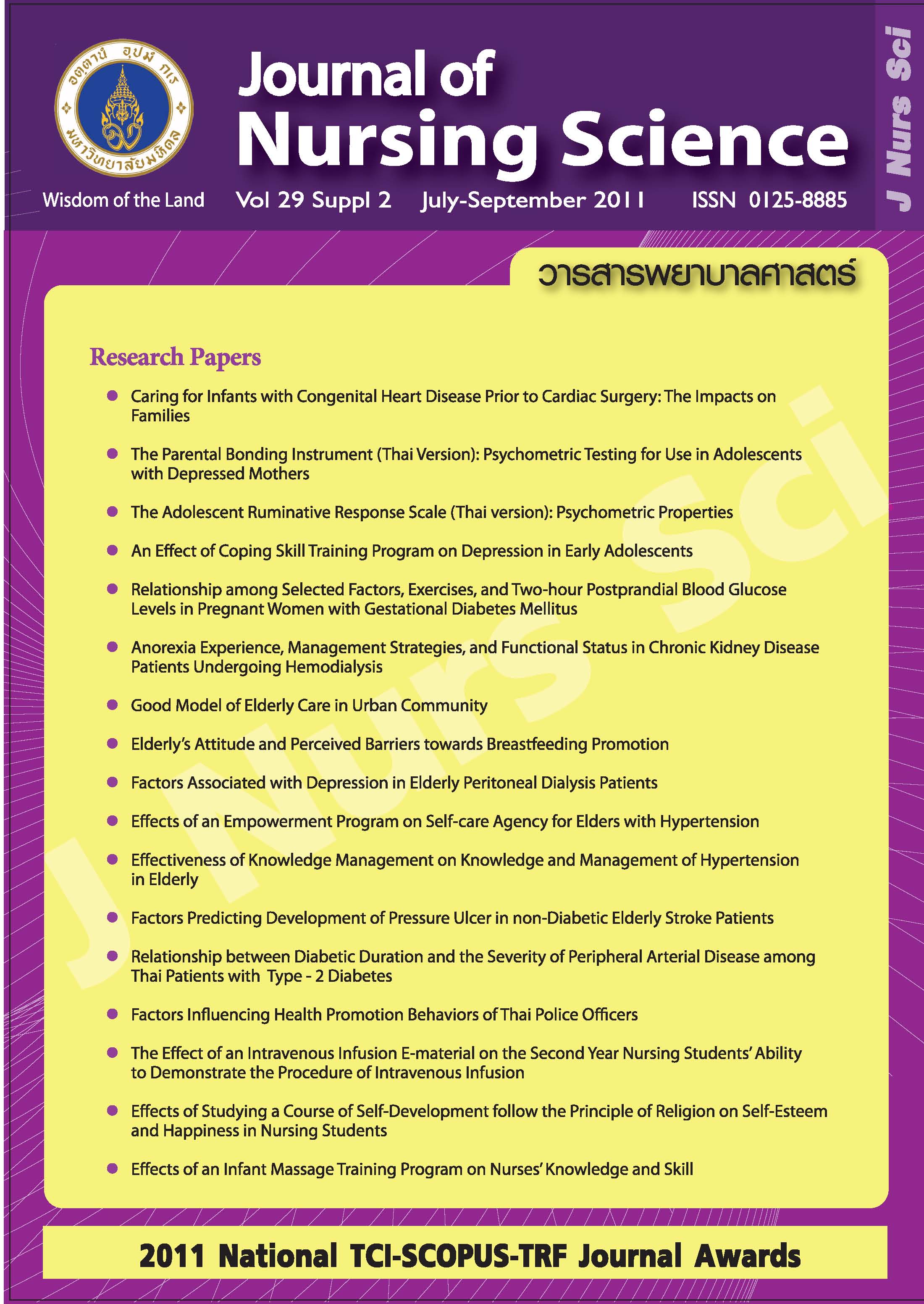Factors Influencing Health Promotion Behaviors of Thai Police Officers
Main Article Content
Abstract
Purpose: This study aimed to examine health promotionbehaviors and factors influencing health promotion behaviors ofThai police officer.
Design: A correlational predictive study design.
Methods: Participants comprised 82 police officers in twometropolitan police stations, Bangkoknoi District, Bangkok,Thailand. The research instruments included a demographic andhealth status questionnaire, health promotion behaviorsquestionnaire, perceived self-efficacy, perceived benefits andbarriers to perform health promotion behaviors questionnaires.The data were analyzed using descriptive statistics and multipleregression.
Main findings: The participants’ age ranged from 23-58 years old.Perceived self-efficacy and perceived benefits to perform healthpromotion behaviors were positively and significantly correlatedwith health promotion behaviors (r = .695 and r = .514, p < .01,respectively). Perceived barriers to perform health promotionbehaviors had a significant negative relationship with healthpromotion behaviors (r = - .349, p < .01). Only perceived selfefficacyto perform health promotion behaviors significantlypredicted health promotion behaviors (p < .01). The three factorscould explain 50.8% of the variance in health promotionbehaviors (p < .05).
Conclusion and recommendations: The results demonstratedthat perceived self efficacy was a significant predictor of healthbehaviors. Nurses should therefore develop nursing interventionsto enhance awareness and self efficacy among police officers toperform health promotion behaviors.
Article Details
Copyright Notice: Nursing Science Journal of Thailand has exclusive rights to publish and distribute the manuscript and all contents therein. Without the journal’s permission, the dissemination of the manuscript in another journal or online, and the reproduction of the manuscript for non-educational purpose are prohibited.

Disclaimer: The opinion expressed and figures provided in this journal, NSJT, are the sole responsibility of the authors. The editorial board bears no responsibility in this regard.
References
Violanti JM, Burchfiel CM, Miller DB, Andrew ME, Dorn J, Wactawski-Wende J, et al. The Buffalo Cardio-Metabolic Occupational Police Stress (BCOPS) Pilot Study: Methods and Participant Characteristics. Annu Epidemiol 2006;16:148-56.
Ramey SL. Cardiovascular disease risk factors and the perception of general health among male law enforcement officers: Encouraging behavioral change. AAOHN J. 2003;51(5):219-26.
Ransom D. Working towards wellness. The Gazette 2010; 72(1):16-7.
Jirapattarasakul S. Occupational stress and health status among traffic policemen in Samutprakarn Province, Thailand. (Thesis) Bangkok: Mahidol University; 2005. 97 p. (in Thai).
Pender NJ, Murdaugh C, Parsons MA. Health promotion in nursing practice 6th ed. Boston: Pearson; 2011. p 47.
Faul F, Erdfelder E, Lang A-G, Buchner A. G* Power 3: A flexible statistical power analysis program for the social, behavioral, and biomedical sciences. BRM 2007; 39:175-91.
Faul F, Erdfelder E, Buchner A, Lang A.-G. Statistical power analyses using G*Power 3.1: Tests for correlation and regression analyses. BRM 2009;41:1149-60.
Walker SN, Hill-Polerecky DM. Psychometric evaluation of the Health-Promoting Lifestyle Profile II. Unpublished manuscript, University of Nebraska Medical Center 1995.
Taweerat P. Research methodology in behavior science and sociology. 8th ed. Bangkok: Srinakharinwirot Prasanmitr 2000. (in Thai).
Mahajan DC, Birari SS, Khairnar GS, Patil YP, Kadam VJ, Joshi YM. Prevalence of non communicable disease risk factors in two groups of urban populations. Asian J
Epidemiol 2009;2(1):1-8.
Panin J. (Pol. Maj. Gen). Police officer and health promotion behaviors [cited 2011 May 30]: Available form: URL: http://www.siampolice.com/forum/index (in Thai).
Auwjenpong J. (Pol. Lt. Gen). Change in police’s health behaviors, proactively promote at the police station by police’s doctor. [cited 2011 May 30]: Available form: URL: http://www.oknation.net/blog/Sp-Report
(in Thai).
Petchthong J. Factors affecting health promotion behaviors among policemen in Suphanburi Province. (Thesis) Bangkok: Mahidol University; 1997. 276 p. (in Thai).
Prateepchaikul L, Chailungka P, Jittanoon P.State of health and health-promoting behaviors among staff: A case study of the Faculty of Nursing at Prince of Songkla
University. Songkla Med J. 2008; 26(2): 1151-62. (in Thai).
Aremu AO, Tejumola TO. Assessment of Emotional Intelligence among Nigerian Police. J Soc Sci. 2008;16(3):221-6.
Gwavuya F. Factors Affecting Job Satisfaction Among Civilian Staff In The Zimbabwe Republic Police. Academic
Leadership: The Online Journal 2011; 9(2). [cited 2011 Dec 21]: Available form: URL: http://www.academicleadership.org/article/print/factors-affecting-job-satisfaction-amongcivilian-staff-in-the-zimbabwe-republic-police
The ten deadly errors. Police an Law Enforcement News. [cite 2011 Dec 21]: Available from http://www.NJLawman.com


